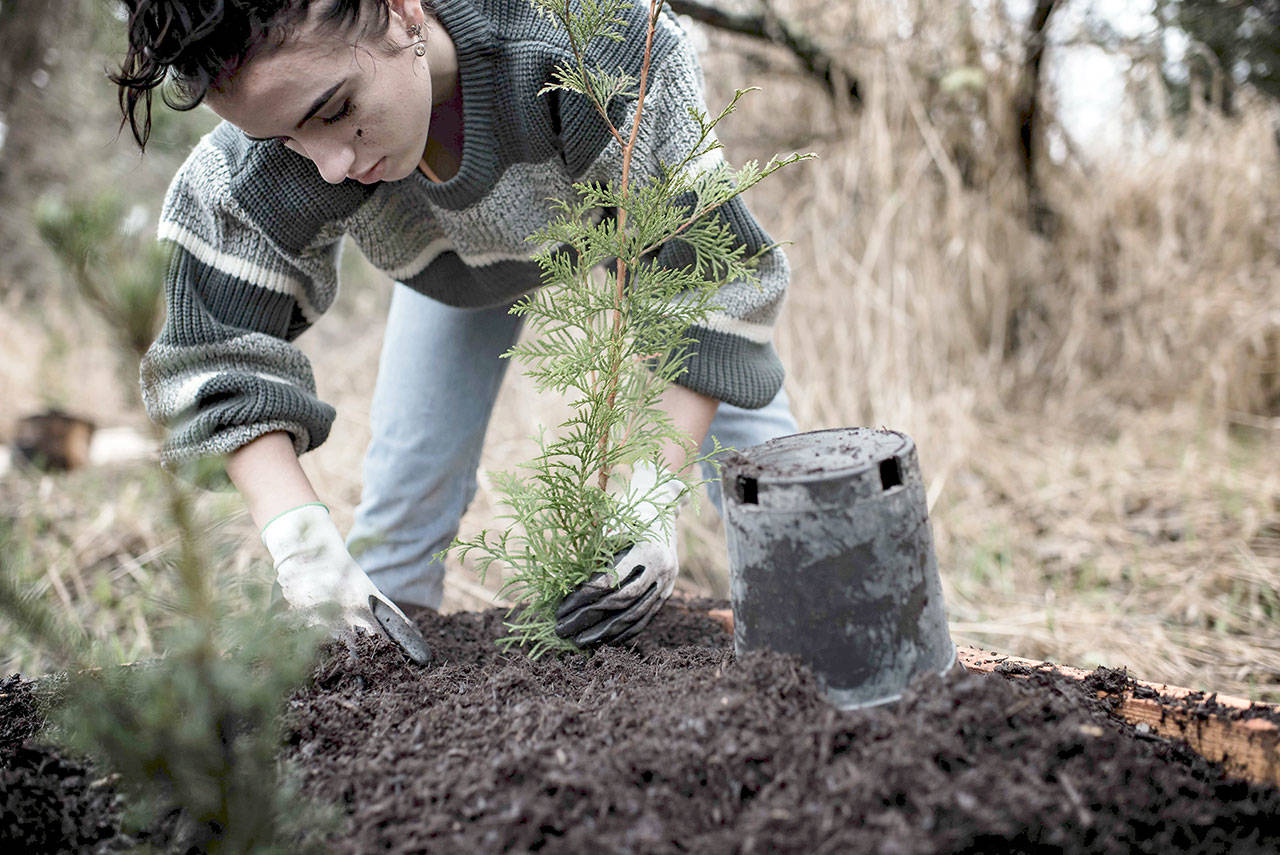QUILCENE — In one day, 180 volunteers planted 4,300 native trees and shrubs along Tarboo Creek.
The Northwest Watershed Institute’s Plant-A-Thon, an annual event since 2005, was held this year on Feb. 4.
Volunteers from area schools worked to restore salmon and wildlife habitat, as well as reduce climate change impacts, by planting 2,300 native trees, and installing 2,000 live stakes of willow and other native shrubs along Tarboo Creek, said Jude Rubin, director of stewardship and public involvement for Northwest Watershed Institute (NWI).
The Plant-A-Thon has become the largest environmental service project in East Jefferson County, Rubin said.
“Since 2005, more than one thousand students, parents, teachers and friends from seven different schools have participated in Plant-A-Thon,” Rubin said.
“Including today’s work, volunteers have planted more than 40,000 native trees and approximately 7,000 native shrubs while earning more than $150,000 for their schools.”
Said Daniel Molotsky, lead teacher for Port Townsend School District’s OCEAN Program: “It is incredibly inspiring to see people of all ages, from pre-school to grandparents, working together to do something for the Earth.”
Each tree is planted in honor of someone special, Rubin said. For a small fee — $5 to $10 — anyone can participate by receiving a Tree Card to personalize and send.
This year’s Tree Cards design was created by artist Hannah Viano.
All proceeds from card sales benefit participating schools: Port Townsend School District’s OCEAN program, Swan School, Quilcene Primary School and Chimacum High School’s Pi Program.
To obtain cards, contact the schools at:
• Swan School: www.swan school.net; 360-385-7340.
• Quilcene School: 360-765-3363.
• Chimacum Pi Program, which is administered by the Middle School office: 360-302-5944.
• OCEAN Program, which is at the Blue Heron campus: 360-379-4259 or 360-379-4251.
The Plant-A-Thon is coordinated by NWI as part of the Tarboo Watershed Program, a long-term effort by the institute and 40 partner organizations to protect and restore salmon and wildlife habitat from the headwaters of Tarboo Creek to Tarboo-Dabob Bay, said Peter Bahls, NWI’s executive director.
During the fall, months before the Plant-A-Thon, students from eleven K-12 classes studied “How salmon grow on trees, and trees grow on salmon,” a classroom-based NWI program that teaches students about the interdependence of salmon and temperate rainforests.
“Having NWI share the watershed model in our classrooms allows students to predict, witness and analyze upland effects on downstream dynamics,” said Kit Pennell, lead science educator for Chimacum Pi Program.
A week before Plant-A-Thon, a team of 31 crew leaders —17 high school students and 14 adult mentors — learned how to lead volunteers in planting and safety procedures.
Students enrolled in NWI’s new Youth Environmental Stewards (YES!) Program and its affiliated Watershed Science and Stewardship Class earn elective high school credit for this and other stewardship projects.
Bahls said that, since 2004, more than 3,000 acres have been preserved in the watershed and more than 600 acres have been restored through rebuilding and replanting impacted streams, wetlands, and marine shorelines.
This year’s Plant-A-Thon took place at a new project that will be protected in perpetuity, with help from the Jefferson County Conservation Futures fund and Jefferson Land Trust.
“The newly restored stream should provide much needed habitat for both adults and young coho salmon, which need slow water habitats to survive their winters in the stream before migrating out to sea,” Bahls said.
Northwest Watershed Institute’s five-member professional field crew worked since last summer to prepare for the planting, by removing non-native invasive weeds, re-meandering the stream channel and adding large wood to provide habitat, Bahls added.
During Plant-A-Thon, volunteers also tackled an acre of streambank dominated by reed canary grass, laying down cardboard and staking it down with live stakes of willow, red osier dogwood, and other shrubs along the creek.
Rubin said that the cardboard smothers the invasive grass until the willow has time to grow and shade it out by the second year, preventing stream bank erosion while helping to shade the stream.
Sheets Unlimited in Renton donated new cardboard sheets to the event.
Volunteers also planted trees in hollow log rounds and planter boxes that function as nurse logs in wet areas where conifers otherwise have trouble growing.
Port Townsend Paper Company donated logs, which were milled into planters and boardwalks, and also were used as habitat logs in the creek.
Organizers hope all of the new trees will provide shade, shape new salmon spawning and rearing areas, and become the base of the food chain for young coho salmon fry.
Funding for the Plant-A-Thon varies each year.
The restoration work is sponsored in part by the EQIP program of the USDA, Natural Resource Conservation Service and by the state Department of Ecology’s Coastal Protection Fund.
The Jefferson Conservation Futures Fund enabled land owners Linda and David Radka to place a conservation easement on the property, ensuring that the new forest will be protected forever.
Funding for trees and field supplies was provided by the state Department of Fish and Wildlife’s Aquatic Lands EnhancementProgram, while educational programming and staff support was provided in part by presenting sponsors: Unitikwa Foundation, Kitsap Bank, Port Townsend Food Coop and NWI.
“Landowners David and Linda Radka are commended for their enthusiastic welcome of so many volunteers to their serene cattle farm,” Rubin said.
Local businesses supporting Plant-A-Thon included Henery’s Hardware, Port Townsend Paper Company, Sheets Unlimited, SOS Printing, and Goodman Sanitation. Other businesses such as San Juan Taqueria, Port Townsend Food Coop, Pan D’ Amore and Farm’s Reach Café donate food. Quilcene, Port Townsend High School Students for Sustainability funded and the OCEAN Program provided transportation.
Those interested in supporting the Plant-A-Thon and the YES! Program may contact Rubin at 360-774-1457 or jude@nwwatershed.org.

